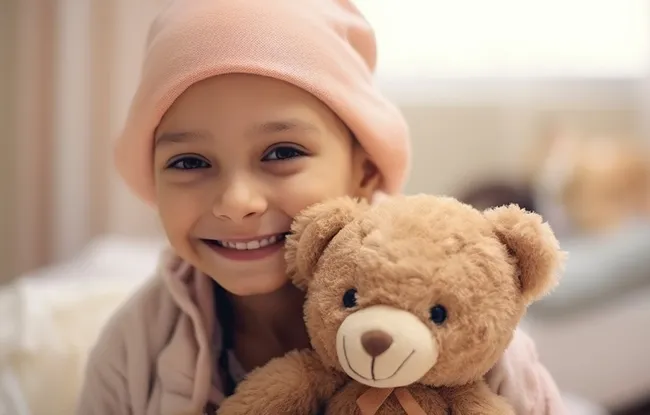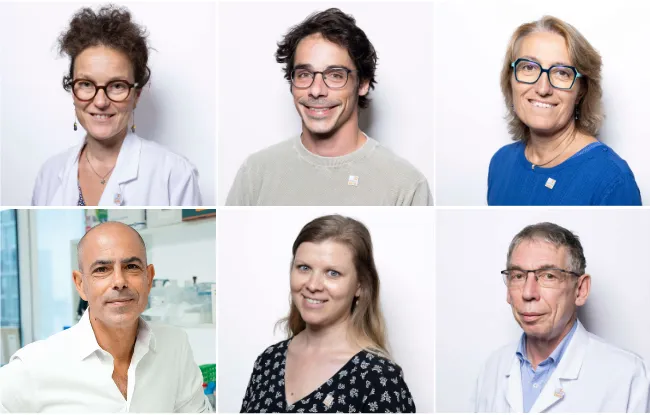- Home >
- Institut Curie News >
- Paris Kids Cancer New Integrated Research Center of Excellence in Pediatric Oncology to fight against cancers in children and adolescents
To respond to the public health challenges linked to the fight against cancer in the youngest patients, the National Cancer Institute has launched a call for applications “PEDIACRIEX23”, allowing the winners to be certified for 5 years. The best specialists in Ile-de-France, one of the main regions in Europe for care and research in pediatric onco-hematology, have united to meet this challenge. Paris Kids Cancer is one of the 3 multi-site centers selected and will benefit from a total budget of 6 million euros
At the head of this center of excellence, bringing together 15 leading players in research and health, Dr Olivier Delattre, director[1], Professors Véronique Minard-Colin[2] and André Baruchel[3], deputy directors, will have the mission of piloting these talents coming from different backgrounds but united by a common objective.
The mission entrusted to Paris Kids Cancer is a public health priority whose importance matches our collective commitment. Paris Kids Cancer is rich in multiple talents in different disciplines. This excellence should allow progress to be made to cure more young patients. This is why we will implement the conditions for success, to break down the dikes and promote innovation in a virtuous and effective synergy. Building on this dynamic driven by three renowned players in pediatric oncology, we will work to bring new treatments to the surface
rejoices Dr Olivier Delattre, director of Paris Kids Cancer.
The creation of this new center is a strong signal for the future of research into childhood and adolescent cancers in France. Combining the best expertise to achieve the ultimate goal that we all dream of, curing childhood cancer in the 21st century, takes on its full meaning given the complexity and specificity of pediatric cancers. We need to pool our strengths to develop these ambitious research programs and accelerate therapeutic innovation
adds Professor Véronique Minard-Colin, deputy director of Paris Kids Cancer.
Understanding, innovating, curing more and better curing childhood cancers is a moral and societal imperative. The creation of Paris Kids Cancer is a key step, bringing together academic actors and parent associations involved in Ile de France but also wanting to be a partner for other national and European centers working in the same direction.
concludes Professor Baruchel, deputy director of Paris Kids Cancer.
Paris Kids Cancer, a solution to the challenges of pediatric oncology
According to the National Cancer Institute, each year in France, 2,260 children and adolescents suffer from cancer. And 450 still die from it, or in 20% of cases. 1 in 440 children develop cancer before the age of 15 in France and the number of childhood cancers has increased by 1 to 2% per year in Europe for 30 years. Today, pediatric cancers still represent the leading cause of death from disease among those under 15 years of age. Behind these figures, so many human tragedies.
It is for this reason that the French State wanted to prioritize the fight against childhood cancer in its third cancer plan. Pediatric cancers are a real challenge for research because they represent a multitude of rare and heterogeneous diseases. They also have their own characteristics, not necessarily being found in adult tumors, yet cancer research is essentially focused on adult cancers.
Faced with this situation, Paris Kids Cancer is committed to finding new and innovative solutions through a modern and collaborative approach. In this sense, their main work will first be focused on understanding and controlling the cellular reprogramming processes of cancer cells, the development of new avenues for immunotherapy and the use of new biomarkers.
At the heart of the project, the essential link between fundamental research, translational research and clinical research
Responding to the research challenges defined in the new ten-year strategy to combat cancer 2021-2030, Paris Kids Cancer will help remove constraints and facilitate rapprochement between researchers and medical researchers, to attract more “practitioner-researchers”.
A cardinal element of this project, translational research is located between fundamental research, the work of which consists of understanding the mechanisms at the origin of the development of cancer, and clinical research which aims to evaluate the effectiveness and tolerance of new treatments or care pathways for patients. This will enable the development of integrated research, leading to rapid and effective clinical applications.
Bioinformatics skills and the analysis of massive data (Big Data) also permeate this major project. Thanks to clinical, genomic, phenotypic, epidemiological, immunological, social data, etc. on each patient, Paris Kids Cancer will be able to improve effectiveness and personalize treatments.
Even beyond this innovative scientific approach combining biology and clinical practice, it will be the breeding ground for multiple disciplines involved in the fight against pediatric cancers: physical, chemical, mathematical or computer sciences but also human and social sciences, public health and epidemiology, and long-term follow-up of adults cured of childhood cancer.
Building on this multidisciplinarity, with the well-being of patients at the center of its concerns, Paris Kids Cancer will carefully study aspects relating to psychological and sociological dimensions in order to better understand their individual, family and social consequences. Several universities, research organizations and partner centers, and three large parent associations are involved in this major project: the Cordeliers Research Center, the Imagine Institute, the Atomic Energy and Alternative Energies Commission (CEA ), the National Institute of Health and Medical Research (Inserm), the National Center for Scientific Research (CNRS), the Hubert Gouin association, the Laurette Fugain association, the Imagine For Margo association, the Paris Cité University, Paris-Saclay University (UPS), Paris Sciences & Lettres University (PSL) and Sorbonne University (SU).
For 12 years, Imagine for Margo has been fighting against childhood cancer by mainly raising funds to finance cutting-edge research programs in order to accelerate children's access to precision medicine, more effective and less invasive for their health . I can only congratulate myself on this great transversal and collective initiative that is Paris Kids Cancer. We are moving in the same direction and the synergy of the driving forces (doctors, researchers, caregivers, caregivers, families and associations) is the only future response to better understand, better care and better support children and their families
adds Ms. Patricia Blanc, president of Imagine for Margo – Children without Cancer.
Ultimately, this program, Paris Kids Cancer, ambitious and structuring, integrating world-renowned research and clinical teams, is a crucial first step in the alliance of Parisian institutions towards more integrated and more collaborative research to improve the understanding of tumors and resistance mechanisms, and seek innovative therapeutic solutions to increasingly cure children with cancer.
[1] Director of research at Inserm and director of the joint research unit U830 Inserm/Institut Curie “Cancer, Heterogeneity, Instability and Plasticity”, Olivier Delattre is also director of the SIREDO Oncology center (Care, Innovation, Research in childhood, adolescent and young adult oncology) and head of the Somatic Genetics Unit at the Institut Curie.
[2] University professor - hospital practitioner (PU-PH) in pediatrics at Paris-Saclay University. A specialist in pediatric lymphomas and sarcomas and the immunology of childhood cancers, Véronique Minard-Colin is head of the Pediatric Committee within the Department of Childhood and Adolescent Cancerology at Gustave Roussy, and responsible for the the Immunotherapy axis of the “CRESCENDO” medico-scientific program. Vice-president of the French Society for Childhood Cancers (SFCE) since 2019 and member of several European boards, notably the European childhood non-Hodgkin lymphoma (EICNHL) and the European Pediatric Sarcoma Soft Tissues Study Group (EpSSG ). She is also a member of the scientific advisory committee of the International Society of Pediatric Oncology (SIOP) and since 2020 a member of the educational council of SIOP Europe.
[3] André BARUCHEL is professor of Pediatrics at Paris Cité University and Hospital Practitioner, in the Pediatric Hematology-Immunology Department of the Robert-Debré AP-HP Hospital. He is an internationally recognized specialist in the field of pediatric and adolescent leukemia and is involved in numerous European cooperative groups. Since 2015, he has been particularly involved in the therapeutic revolution represented by immunotherapy using genetically modified cells (CAR-T cells), the Robert-Debré AP-HP Hospital having been the first pediatric center approved in France for this treatment. . He is Vice-President of the French Society for the Fight against Childhood and Adolescent Cancers and Leukemias (SFCE).




